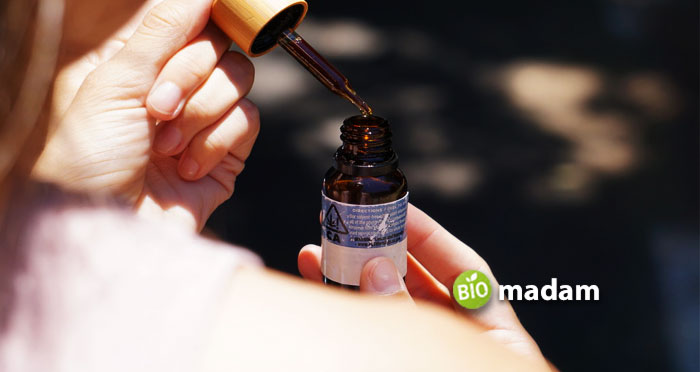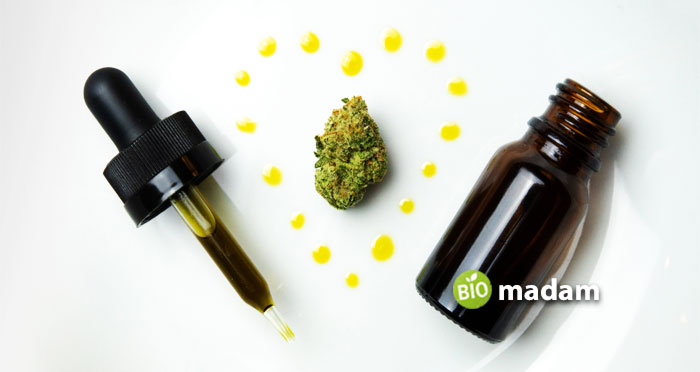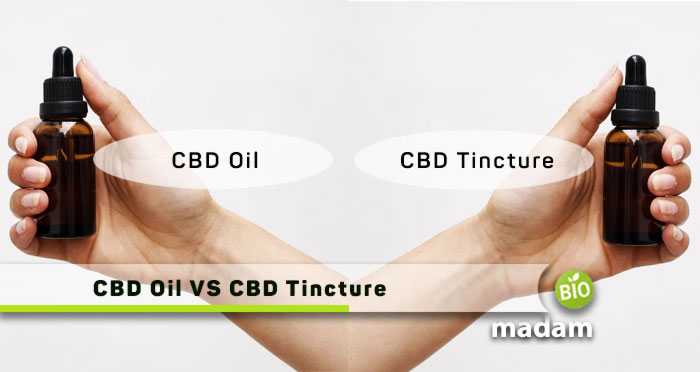With the increase in the use of Cannabis for medical purposes, the demand for CBD oil and tincture has risen. People who do not know much about technicalities often confuse the two forms of CBD.
If you also think CBD oil and tincture are the same, you are mistaken. They are distinct in nature with their specific properties that we will discuss in detail, but the primary difference between CBD oil and tincture lies in the extraction method.
Manufacturers produce the former by mixing Cannabidiol with an inert carrier oil like MCT coconut oil. On the other hand, the tinctures are alcohol-based. Let us take you through all the differences between them.
Comparison Table
| Characteristic | CBD Oil | CBD Tincture |
| Ingredients | Carrier oils, flavors, vegetable glycerin, etc. | Alcohol, essential oils, vitamins, sweeteners, etc. |
| Base | Oil | Alcohol |
| Flavor | Earthy | Bitter |
| Consistency | Thick | Thin |
| Absorption | Slow | Fast |
| Onset of Action | 10 minutes | Immediate |
| Potency | More potent | Less potent |
| Better If | Alcohol allergy | Coconut oil allergy |
| Topical Application | Effective | Less effective |
| Side Effects | Fatigue, diarrhea, and loss of appetite | Nausea, vomiting, and dizziness |
| Shelf Life | 12 – 18 months | 3 – 5 years |
| Price | Expensive | Less costly |
What is CBD?
Cannabidiol, commonly known as CBD, is the active component of the Cannabis sativa plant, also called Marijuana or Weed. The plant was initially used for recreational purposes. However, now it is legal to use CBD plants in 14 US states for medicinal purposes. It is used in various health conditions, including restlessness, different types of anxiety, pain, acne, aggression, stimming in autism, etc.
The best part about CBD is that it does not have an intoxicating effect like THC, the other component of Cannabis.
CBD affects the endocannabinoid system (ECS) in the body, which regulates mood, sleep, appetite, and memory. While the exact mechanism of action is unknown, Cannabidiol is thought to prevent the breakdown of endocannabinoids. They are similar to cannabinoids but naturally present in the body. Some studies suggest that CBD binds to TRPV and 5HT receptors in the endocannabinoid system.
Uses of CBD
CBD is involved in improving body functions by interacting with the nervous system. Physicians suggest CBD for various health issues, such as:
- Epilepsy
- Dystonia (muscle disorder)
- Parkinson
- Crohn’s disease
- Pain
- Anxiety
- PTSD signs and symptoms
What is CBD Oil?
CBD oils are more commonly used than tinctures. They are a mix of cannabidiol extract, carrier oil like MCT coconut oil, and phytonutrients, such as vitamins and minerals. The CBD extract is obtained from the flowers, seeds, and stalks of the Cannabis plant. Manufacturers extract CBD, flavonoids, and terpenes from plants to make the oil.
Full-spectrum oils are prepared by mixing these components with an inert carrier oil. The oils developed from this method may have up to 0.3% THC, giving an entourage effect. It refers to the combined use of THC and CBD for added benefit. Artificial flavors may be added to the oil to make it palatable.
CBD oil is the most potent and expensive CBD product. Ensuring that you use the right product is essential yet challenging as many vendors sell CBD oil as tinctures and vice versa. Surprisingly, this practice is not new and has been going on for years.
CBD Oil Ingredients
CBD oils comprise cannabidiol extract mixed with carrier oils and base oil. The base oil helps dilute CBD for the desired effect. They include the following:
- Hemp seed oil
- MCT oil
- Coconut oil
- Vegetable glycerin base

CBD Oil Dose
CBD oil is quite potent and must be consumed in adequate amounts. You may take 2 to 3 teaspoons of oil per day. Yet, the exact dose depends on your body weight and your condition. It is suggested to consult a doctor before taking CBD oil. It has proven to provide autism help for parents with children on the spectrum.
CBD Oil Pros
- Potent
- Easy dosing
- Made with few ingredients
- Topical application
- Can be taken with food and drinks
CBD Oil Cons
- A little expensive compared to other forms of CBD
- It may have a strong taste
What is CBD Tincture?
A tincture is related to anything prepared in alcohol. CBD tinctures are formulated the same way using 60% to 70% distilled alcohol. It involves saturating the hemp material with high-proof alcohol. The mixture is then heated slowly for a brief period. The process enables the infusion of CBD with alcohol to deliver readily bioavailable cannabidiols to the body.
CBD tinctures use CBD components isolated from various types of leaves and stalks of Cannabis sativa. A few types of tinctures may substitute alcohol with glycerin or vinegar. Sometimes, manufacturers use carrier oils instead of tinctures, which do not produce the same effect as a tincture. Natural flavors are also added to the tincture to mask the strong taste.
You may use CBD tincture the same way as CBD oil. Though it is not as potent as CBD oil, tinctures have a higher bioavailability due to alcohol. CBD tinctures have faster absorption, and water-soluble CBD can be used in cooking.
CBD Tincture Ingredients
CBD tinctures have different substances compared to CBD oils. Some of them are added to enhance flavor, including:
- Alcohol
- Melatonin
- Herbs
- Essential oils (lavender, basil)
- Essential Vitamins (C, D, B12)
- Sweeteners
- Water

CBD Tincture Dose
There is no particular given dose for CBD tincture, yet you must not use more than 1500 mg per day of cannabidiol a day.
CBD Tincture Pros
- Tinctures are also easy to dose
- Rapid onset
- High bioavailability
- You may mix it with beverages or food
CBD Tinctures Cons
- Not highly effective topically
- Bitter Flavor
Difference Between CBD Oil and Tincture
Definition
CBD Oil
CBD oil is a cannabidiol formulation prepared by adding CBD to an oil base.
CBD Tincture
It is made by suspending parts of the Cannabis sativa plant in alcohol.
Ingredients
CBD Oil
CBD oil comprises carrier oils, vegetable glycerin, supportive ingredients, and flavors.
CBD Tincture
Whereas, CBD tincture constitutes alcohol, herbs, essential oils and vitamins, water, and sweetener.
Base
CBD Oil
CBD oil is prepared in an oil base.
CBD Tincture
Alternatively, CBD tincture has an alcohol base.
Flavor
CBD Oil
They have a more help-like, earthy flavor.
CBD Tincture
On the contrary, CBD tinctures are bitter in the absence of artificial flavor.
Consistency
CBD Oil
The consistency of CBD oil is heavy due to an oil base.
CBD Tincture
Otherwise, tinctures are comparatively light in weight.
Absorption
CBD Oil
CBD oils have a slower absorption.
CBD Tincture
However, CBD tinctures absorb fast and are readily bioavailable.
Onset of Action
CBD Oil
They take around 10 minutes to produce action in the body.
CBD Tincture
Although, these preparations have an immediate onset of action.
Potency
CBD Oil
CBD oils are more potent.
CBD Tincture
In contrast, CBD tinctures are not as potent as CBD oils.
Better If
CBD Oil
It is a better option if you are allergic to alcohol.
CBD Tincture
At the same time, it can be a better choice in case of a coconut oil allergy.
Topical Application
CBD Oil
You may use them as a topical application.
CBD Tincture
Nonetheless, they do not offer the same topical efficacy as CBD oil.
Side Effects
CBD Oil
It may cause fatigue, diarrhea, and loss of appetite.
CBD Tincture
Though, tinctures typically lead to nausea, vomiting, and dizziness.
Shelf Life
CBD Oil
CBD oils can stay good for 12 to 18 months.
CBD Tinctures
Conversely, you can use CBD tinctures for as long as 5 years.
Price
CBD Oil
They are more potent but higher in price than tinctures.
CBD Tincture
Instead, CBD tinctures are relatively low-priced.
The Bottom Line
CBD oils and tinctures are used widely to treat conditions like pain, acne, muscle disorders, Parkinson’s, Epilepsy, and symptoms of autism in adults and children. CBD oil is more commonly manufactured and used compared to CBD tinctures. The primary difference between CBD oil and tincture is the base material. The former contains oil as a base, whereas the latter is made with alcohol. CBD oil is more potent and can be used topically. Alternatively, tinctures are more bioavailable yet not the best topical choice. You may choose one of these two options depending on your need and preference per the details provided in the article.
FAQs
Which is better CBD oil or tincture?
None of them is considered better than the other as it depends on your requirement. CBD oil is a better option if you want to apply topical, whereas the tincture has a long shelf life.
What is CBD tincture good for?
They are widely used to help relieve pain and anxiety. Tinctures are made with 60% – 70% alcohol instead of oil.
Does CBD tincture give you a high?
Cannabis sativa contains two significant components, THC and CBD. THC is an intoxicating compound, while CBD does not give you a high. Thus, CBD compounds are used for medicinal purposes commonly instead of THC.
How much CBD tincture should I take for sleep?
There is no particular dose of CBD that you may take for all diseases. Clinical trials have shown the effect of Cannabidiols between 25mg and 1,500 mg daily. Consult your doctor before taking CBD oil or tincture for any condition.

Hi, my name is Eva. I am currently practicing as a clinical social worker, that being my childhood desire. As a licensed therapist holding MPhil in Clinical Psychology, I am now on biomadam to provide the natives with the best family advice! Do you have any questions? See you in the comment section.

